Deborah J. Ross's Blog, page 146
July 6, 2012
Jaydium, Free Chapter
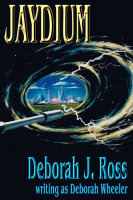
And now, just to do something different, here's the first chapter of Jaydium for you to enjoy. If you can't wait to find out what happens next, you can download the whole thing from Book View Cafe (And the files will play nicely with your Nook or Kindle, as well as other devices). If not, come on back next week for the next episode...
JAYDIUM
by
Deborah J. Ross, writing as Deborah Wheeler
Chapter
1
Dust, Kithri thought as she shoved her
shoulder against the door of The Thirsty Miner Tavern. The pitted duraplast
jerked open, sending a drift of gray-brown powder over her boots. My whole
life is turning to dust.
Dust
was everywhere on the single inhabited continent of the planet Stayman. It
clung to the folds of Kithri=s
dun-colored overalls and sprinkled her ragged brown curls. Sifting past the
shutters or tracked in at the door, it invaded even the corners where shadows
lay thick and stale.
The
Thirsty Miner gathered its fair share of dust. Other bars catered to in-system
traders, the few Federation agents who cared to rub shoulders with locals or
the farmers who, when they came into town at all, kept stubbornly to
themselves. But this bar, small and far from the center of Port Ludlow,
attracted only its regular customers, jaydium miners all.
Look
at them, Kithri
thought, pausing as the door swung shut behind her. They=re already drinking up every
credit they=ve
made on this run.
Old
Dowdell and his two tavern buddies, identical in their rumpled miners= overalls and grizzled faces,
looked up from their usual places at the centermost table. Kithri turned her
back on them and leaned her elbows on the bar. The barkeep set a mug of brew in
front of her.
A
few more years, and I=ll
be just like them.
This
was not strictly true. Although Kithri had come to Stayman as a homesick
adolescent, she would never be anything but an outsider. One day her clear gray
eyes might dull under the faint film that never seemed to leave the other
miners= eyes, and her youthful skin
might dry up into a mass of crevices like theirs, but she could never change
who she was--the daughter of a Federation scientist.
Kithri
might not belong to Stayman, but Stayman had left its mark on her. The heavy
fabric of her overalls could not hide the long curves of her thighs, or
shoulders grown muscular from years of chipping jaydium. She rubbed her nose
where it had once been broken and sipped the tepid brew, wishing for the
hundredth time that morning there was somewhere else to go, something else to
do. She could drag out her outdated astrophysics texts and pretend to study,
but what would be the use?
I=m never going to get off this
miserable planet! Not to University, not to anywhere!
"Hey,
Bloodyluck!"
"Dowdell,"
she muttered without turning around, "there=s nothing you have to say that I
want to hear, so stuff it."
"I
hear Nash=s looking for a whore on his
in-system route. Fix you up good, you might do."
Kithri
took her mug and stalked over to the farthest, darkest corner. Dowdell=s raucous laugh followed her,
"...=course we=d all expect free
samples..."
At
the rate she was going, flying singlo, it would take years to save the
rest of her passage off-planet. The Federation freighters came too infrequently
and too much of her earnings dribbled away just to survive on this desolate
hunk of rock. But if she could find someone else trained in duo--someone
besides that dustbug Dowdell--all it would take would be one, maybe two good
runs. She could even make another haul before the freighter took off tonight.
Kithri
leaned against the grimy ash-brick wall and closed her eyes, trying to remember
Albion=s rivers and flowered fields, the
clear blue sky, the billowing golden clouds. The images were fragmentary, a
child=s memories, luminous and blurred.
Albion itself was now a radioactive cinder.
Lost
in her daydreams, Kithri didn=t
look up as the door swung open again and a man stood there, silhouetted against
the glaring daylight. His off-worlder clothing--closefit pants, shirt and vest,
laced boots--did little to mask the hard, lean contours of his body. Close
behind him came a stunningly beautiful woman in a tailored medic=s uniform and a taller man,
brassy-haired and smiling. Dowdell let out a long whistle and glanced towards
the corner where Kithri sat, her eyes still closed.
The
barkeep set three mugs of brew in front of the newcomers. "Hank," he nodded
to the tall man. "Been a while."
In
her corner, Kithri opened her eyes, slowly focusing on the three newcomers. Her
expression hidden by the dense shadows, she got noiselessly to her feet.
The
woman looked down at her mug and wrinkled her nose at the dingy, froth-covered
liquid. "Is this all there is?"
"Avery,
my love, you wouldn=t
want to try the alternatives," said Hank. "The water=s laced with metal salts and the
rotgut=s only good for a three-day
drunk."
The
second man lifted his mug to his lips. His vest fell open and revealed a
leather shoulder holster carrying a force whip, an exotic weapon for a planet
where simple stunguns were the norm.
"It=s better than aardwolf
piss," he commented.
"Such
language, Eril!" said the woman. He leaned toward her, laughing, a male
version of her beauty--dark hair, faint epicanthic folds of the eyelids, golden
skin. But while she was all silky curves, there was nothing effeminate about
him. Instead, he was sleek and taut like a sand-leopard, the kind of predator that
relished trouble.
Hank
turned away from the bar, unaware of Kithri=s silent approach. "Yes, my
love, this lowly tavern was the scene of many a youthful adventure of mine. I
remember the time this trader took the notion one of the miners=d hyped his stash. Now, I knew
Grizz=d done no such thing--all the man
knows is jaydium and getting drunk, in the reverse order. And besides, the
trader=s so stoned on bloodroot he can=t even remember where he put his
own head. He pulls out a knife as long as your forearm--" Hank gestured
dramatically, "--screams like bloody hell and goes ramming for Grizz.
Well, what was I to do, let an honest miner get his kidneys chopped? I vault
over those three tables there and foot-sweep him. Bam! Down he goes! Then I
break a chair over his head, wrestle the knife out of his hands, and--"
"You=re nothing but a dustbug liar,
Hank Austin!" Kithri slammed her mug down next to his. "In case you=ve forgotten, it wasn=t a chair I smashed over
the trader=s head, it was a bench.
All you did was stick your foot out and pick up the pieces
afterwards."
"Kithri!
By all the powers of luck and space, what are you still doing here?"
She
winced. "It=s
great to see you, too. C=mon,
if we scramble we can make one more duo haul on this run. There=s five, almost six hours until
lift-off."
"Who
is this...person?" asked the petite beauty, slipping her hand
through Hank=s arm and narrowing her eyes.
Hank
straightened up. "Avery my love, meet my old flying partner, Kithri
Bloodyluck. Ask me sometime how she got that name. It makes the other story
sound like an old ladies=
tea party. Kithri, this is my wife."
"Your...wife."
In her soaring excitement, Kithri had barely noticed the two strangers. She
swallowed hard, her tanned face flushing to an ugly shade of copper. The dim
light of the tavern masked it and her voice was steady enough. That was lucky,
because she could feel the eyes of the other miners on her, searching her for
any hint of weakness. They=d
given up any pretense of lack of interest and were staring frankly. After Hank
had signed on as a Federation pilot, she=d
had her fill of speculation about their having been lovers--and who would take
his place. The thought of another round of Dowdell=s jokes was enough to turn her
stomach.
"I
wanted to show Avery where I used to hang out before I enlisted," Hank
said. "Now that the war=s
over--" He paused, his handsome brow furrowing. "You didn=t think I came back here--just to
run jaydium, did you? I=m
not that crazy, and besides, there=s
my bonus money."
Kithri
picked up her mug. The brew tasted flat and bitter. "It=s nice one of us doesn=t have to work for a
living."
"What
about you? You=re
not still running jaydium, are you?"
"What
else should I do on this dustball planet, open a beauty parlor," she
jerked her chin toward Dowdell and his cronies, "for the likes of
them?"
Hank
spread his hands apologetically. "Hey, it=s nothing personal."
"The
whole thing=s too damned personal, if you ask
me." Kithri strode out of the bar, leaving the rest of her drink. Dowdell
let out another long whistle as the second newcomer slapped his own mug down
and hurried after her.
oOo
Too
angry to think straight, Kithri hurried down the broad unpaved street that lead
to the jetport. Why, why, why had she allowed herself to hope--even for
the briefest moment--that Hank might have come back to help her, as he=d promised when he left? After
flying duo together, she knew what he was--a self-centered, vainglorious
bastard who happened to fly like a dust-devil. And who kept his promises only
when it was convenient and profitable. There was no hope for her, and what=s more, there never had been.
What a fool she was!
Against
her will, tears spilled down her cheeks. She broke into a headlong run. Here at
the edge of Port Ludlow there were only a few straggler buildings, ash-brick
like The Thirsty Miner. Nobody would see her weakness. The locals were all in
their favorite drinking places, getting sensibly plastered.
"Kithri!"
came a shout behind her, a man=s
voice. "Kithri Bloodyluck!"
She
slowed, turning her head, ready to keep going if it were Dowdell or one of his
pals, unable to resist the temptation. It was the second man from the bar.
Relieved and curious, she slowed to a walk. The next moment he caught up with
her.
"Who
the hell are you?" she asked.
"Eril,
Eril Trionan. I=m
Avery=s brother."
Kithri
scrubbed at her tears with the back of one dusty sleeve. Her eyes smarted in
protest. "That scrub-pilot-turned-war-hero married your sister?"
"Hank=s not so bad, as long as he
thinks there=s something in it for him. And he=s one hell of a good
pilot--"
"Don=t apologize for him, he only came
back to show off and laugh at the local brushies. He thinks he=s so tough--well, I could fly
circles around him in my sleep. Lucky, that=s all he is. What d=you want?"
"I
can fly duo."
For
a long moment Kithri could do no more than stare at him. Her eyes rested on the
tiny jagged scar on one cheek that saved his face from outright prettiness. His
dark eyes measured her in return, and she wondered what he thought of her broad
shoulders and slightly crooked nose, so different from his sister=s daintiness. Finally her brain
got itself back into gear. What did it matter what he thought of her? He was
probably no different from Hank. She=d
had enough of pretty fly-boys and their promises.
She
forced her lips to move. "Ratshit."
"In
space. Hank was my co-pilot," he answered, grinning. "Try me."
"You
want to go on a jaydium run...with me?" Her eyes narrowed.
"Why?"
"What
else is there to do here? Get drunk? Listen to Hank tell bar-room lies I could
make up better myself? The one thing Stayman has to offer is jaydium, and that=s halfway across the
continent." His words, although spoken firmly enough, didn=t have the right ring to them. A
bored tourist he wasn=t,
but that was his business.
What
does that matter? whispered
through her mind. It=s
one more run, the best chance you=ll
get. You wouldn=t
have to promise him anything, just let him fly with you...
"I=d be crazy to do it," she
said, but not as forcefully as before.
"You=d be crazy not to,"
Eril answered good-naturedly. He gestured back towards the tavern. "Hank=s not running jaydium any more.
Not now, not ever again. He said the only other miner here who was trained in duo
was some old sourbug named Dowdell and that you=d kicked him halfway to Hyades
when he got so horny he wouldn=t
take no for an answer."
"Hank
said that, did he?"
The
mental backlash of emerging from duo affected people differently, the
most common reaction being a brief but intense erotic rush. Kithri had never
experienced it herself, but she=d
had her fill of its consequences. For all his faults, Hank had enough sense to
back off and look for easier pickings elsewhere.
"What
else did Hank tell you about me?" she asked.
"That
you were damned good."
Kithri
bit her lip, considering. The angry flush had drained from her face, leaving
her cheeks a light, even tan against the rich brown of her curls. She studied
Eril speculatively. "You ever chipped jaydium before?"
"I=m willing to learn."
"It=s no picnic, I can tell you. The
work=s rough and dirty and the flight
across the Cerrano can kill you. Why would you want to risk it?"
"You
want the truth?" Eril stopped grinning. "All right--it=s the money. Hank told me what
you made on a duo run, with the jaydium still intact. If he=s too love-addled to take it, I
will."
Kithri
nodded, relaxing. Greed was something she could understand. "You might
change your mind once you see Brushwacker. But it won=t hurt to take a look."
oOo
The
Port Ludlow jetport was definitely third-class. The only landing space worth
anything was currently dominated by a single, heavily-guarded Federation
shuttle, used for ferrying hauls of jaydium ore to the orbiting freighter, where
it was sealed in hard vacuum to prevent further deterioration. A few battered
in-system traders sat beyond it, looking like poor country cousins. Miners= scrubjets lined the paved
runways at the edge of the field. Further south and west, patches of muted
green marked the beginning of Stayman=s
insular agricultural community. The patches centered on prewar tapwells, for
Stayman=s water resources lay deep within
the bedrock aquifers.
Kithri
ran one hand over Brushwacker=s blunt nose and sent the thin layer
of dust up in little billows. Like her, it was different, set apart. Its
metalloceramic skin wore only a dull patina from years of abrasion by the
ever-present dust. The other miners painted and repainted theirs with bright,
outlandish designs--flames and snakes with gaping mouths, jagged lightning,
women with wings. Each one tried to outshine the others.
The
stubby, wide wings that gave Brushwacker its unusual maneuverability
were set in specialized mountings that permitted minute changes in angle. The
engines, too, were capable of rotating to vary the direction of thrust. The
narrow body of the scrubjet acted as a secondary airfoil and within its curved
contours, space was at a premium. Since the death of Kithri=s father, no one but she had sat
in the pilot=s seat. Hank--and Dowdell for
that one ill-fated flight--had always taken second place.
She
slid the door open and stepped back for Eril to take a look. He poked his head
in and said, "Looks like there=s
enough room to take a deep breath, but skies help you if you get the urge to
scratch your pitouchee."
Kithri
raised one eyebrow, not quite ingenuous enough to ask what a pitouchee
was. "Still game?"
"Compared
to the new needle scouts, this is positively spacious."
"In
you go, then. You run the co-pilot=s
check, and if you get it right, you=re
on."
Eril
climbed into the second pilot=s
seat and pulled the harness straps around him. He took a few moments to study
the panels, then began his inspection. Kithri watched him, liking the way he
moved in the cramped space, sensing where the 'jet=s walls were without having to
bang his elbows into them, liking the meticulousness with which he
double-checked everything. But he=d
had an unforgiving teacher--in space, carelessness was invariably fatal.
He
looked up as she folded herself into the seat before him, her shoulders between
his knees. She didn=t
touch him as she checked his work again. "All right, you pass," she
said, closed the door, and thumbed the engines into life.
"What=s the drill?"
"Manual
in the 'port and out past the hills. That=ll take us to the Cerrano Plain,
a good three thousand miles across. Then into the Manitous themselves."
"How
deep into them?"
"Depends
on where the jaydium is. Could be as much as ten miles. You ever flown a
tunnel?"
Kithri
nudged Brushwacker from its berth and along the runway leading east
toward the hills. The tiny ship moved smoothly under her hands, as if it were a
living thing that knew her touch.
"No,
but I=ve heard they=re as predictable as a trader=s promise. A system of natural
tunnels that run all through the mountain range."
Kithri
laughed. "That=s
not half of it. There=s
no jaydium worth having on the surface, so you have to follow the tunnels deep
into the mountain. They twist worse than a dish of noodles‑‑one wrong turn and
you=ll end up plastered against the
wall."
"You=re
not the noodle type," he said. "And neither am I.

Published on July 06, 2012 01:00
July 5, 2012
AMAZING STORIES Interviews begins...
[image error]
Check out the restored/reinvented/rejuvenated/reincarnated Amazing Stories online. Among other delights, it features a series of round-table discussions with the members of Book View Cafe.
I had such fun participating in this project. Each of us began the discussion of a different question, so that no one person had to set the tone. And because we're all um, highly opinionated people, there's a delicious diversity of viewpoints, as well as ideas building on one another. Except for the format, which allowed only one response from each participant to each question, the discussion has the flavor of a panel at a convention.
From the website, click on the cover or here to get started. The first questions are, "Is science fiction definable?" and "Is science fiction dying?" Here's my answer to the second one:
I read this question in three different ways.
One, have we run out of sfnal ideas and writers to turn them into stories?
Two, is it so unprofitable to publish sf that the genre is headed for extinction?
Three, are readers no longer interested in sf? Here is my own very brief answer to the first.
We have not run out of ideas, enthusiasm, or writers. In its history,
science fiction received two enormous boosts. The first came at the end
of the 19th Century, with the Victorian era explosion of technology and
scientific discovery. This was the era that gave us Jules Verne and H.
G. Wells, and the next generations of writers. It also continues to
generate tales of mechanical genius, romance, and adventure through the
current steampunk genre, which hearkens back to the time when technology
was understandable by the ordinary person.
The second boost came with the space race of the mid-20th Century and
the focus on science education, plus the coupling of astronomy, post
World War II pyrotechnics, and old-fashioned derring-do. Then came a
period of disenchantment with technology and with science itself; when
invention created more problems than it solved, the future no longer
looked so shiny. I hope the pendulum has begun to swing the other way
now. Although the frenzied pace of manned space exploration has
moderated, today’s crop of space telescopes (Hubble, Chandra, Kepler,
and others) bring us the universe as we have never before seen it, so I
hope there will be no lack of inspiration in astronomy, biology,
chemistry, geology, oceanography, computers… and therefore, no dearth of
great science fiction story ideas.
Up next: Is literary fiction better than science fiction? Hope you enjoy the discussion!


Check out the restored/reinvented/rejuvenated/reincarnated Amazing Stories online. Among other delights, it features a series of round-table discussions with the members of Book View Cafe.
I had such fun participating in this project. Each of us began the discussion of a different question, so that no one person had to set the tone. And because we're all um, highly opinionated people, there's a delicious diversity of viewpoints, as well as ideas building on one another. Except for the format, which allowed only one response from each participant to each question, the discussion has the flavor of a panel at a convention.
From the website, click on the cover or here to get started. The first questions are, "Is science fiction definable?" and "Is science fiction dying?" Here's my answer to the second one:
I read this question in three different ways.
One, have we run out of sfnal ideas and writers to turn them into stories?
Two, is it so unprofitable to publish sf that the genre is headed for extinction?
Three, are readers no longer interested in sf? Here is my own very brief answer to the first.
We have not run out of ideas, enthusiasm, or writers. In its history,
science fiction received two enormous boosts. The first came at the end
of the 19th Century, with the Victorian era explosion of technology and
scientific discovery. This was the era that gave us Jules Verne and H.
G. Wells, and the next generations of writers. It also continues to
generate tales of mechanical genius, romance, and adventure through the
current steampunk genre, which hearkens back to the time when technology
was understandable by the ordinary person.
The second boost came with the space race of the mid-20th Century and
the focus on science education, plus the coupling of astronomy, post
World War II pyrotechnics, and old-fashioned derring-do. Then came a
period of disenchantment with technology and with science itself; when
invention created more problems than it solved, the future no longer
looked so shiny. I hope the pendulum has begun to swing the other way
now. Although the frenzied pace of manned space exploration has
moderated, today’s crop of space telescopes (Hubble, Chandra, Kepler,
and others) bring us the universe as we have never before seen it, so I
hope there will be no lack of inspiration in astronomy, biology,
chemistry, geology, oceanography, computers… and therefore, no dearth of
great science fiction story ideas.
Up next: Is literary fiction better than science fiction? Hope you enjoy the discussion!

Published on July 05, 2012 09:20
June 27, 2012
SPECIAL ROUND TABLE: Sexuality in Fantasy
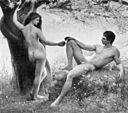
by Gustave Courtois
Hello, everyone, and welcome to another installment of the Amazing Migrating Fantasy Round Table, started earlier this year by Sylvia Kelso. This month, I'm hosting the topic of sexuality in fantasy. Here you'll find a range of viewpoints, ways of approaching the topic, . Please join in the discussion!
A few years ago, I had the privilege of editing a new
anthology series, Lace and Blade,
from Norilana Books. The concept was a certain flavor of elegant, romantic
sword and sorcery, witty and stylized, sensual yet with plenty of swashbuckling
action (think The Scarlet Pimpernel
with magic). Because we wanted to release the first volume for Valentine’s Day,
I contacted a group of seasoned professional authors, people I could depend on
to understand what I was looking for and to deliver top quality stories to
deadline. For various reasons, the publisher wanted the second volume to be
open submissions. If I'd had any idea what I was getting myself into, I would
have refused. Insulated in the world of competent fantasy writers and readers
who are versed in the grandeur of writers from J.R.R. Tolkien to Tanith Lee, I
was ill-prepared for what mundanes think of when they hear “fantasy.”
Needless to say, when I talk about sexuality or eroticism or
sensuality or gender issues in fantasy, I do not mean pornography. It seems
that for far too many people, sexuality is such an emotionally difficult
subject that instead of facing it honestly, discussing it openly, they shroud
it in prurience and embarrassment, or else turn it into something salacious or
forbidden. Yet just about every human being over the age of puberty has had
sexual feelings (notice my delicate use of qualifiers). So if sexuality in
fantasy does not mean “your most
lascivious and pornographic imaginings, regardless of whether you’d really like
to do these things, because how would
you know what you enjoy if you’ve never been permitted to experiment,” what is
the role of sexuality in fantasy? Does it even have one? Should we keep sex out
of fantasy literature, restrict the love stories to a chaste kiss now and
again, and keep the hero/ine’s mind firmly fixed on nobler causes?

by Salvador Viniegra
I believe that sex is such a powerful force in human lives
that it is impossible to portray the full scope of emotions and motivations
without it. People might not, for a whole panoply of reasons, act on their
sexual desires, but they have them. They have them in wildly inappropriate
situations, as well as those times and places that nurture genuine emotional
intimacy. The feelings are ignored or fulfilled, misdirected or frustrated,
overly indulged or denied utterly. Freud had a few things to say about what happens
when such a basic drive does not find healthy expression, and although his
theories were dead wrong on many counts, he was not mistaken about the fact
that sex will not go away simply because society (aka The Authorities, secular
or clerical) disapprove. So already, we have two ways in which considerations
of sexuality are important to any story: character development and
world-building.
What are the attitudes and practices regarding sexuality in
this culture? Is it permissive, repressive, or a combination? Is marriage
live-long or fixed-term? Monogamous, polygamous, polyandrous? Do different
cultures in your world treat love, sexuality, and marriage in the same way?
(For example, how are sexual fidelity and jealousy regarded? Is marriage a
personal or a business relationship? Who determines what is acceptable in sexual
behavior? Have norms changed over time and if so, why? What are the social, moral
or legal consequences of transgressions? Are there times, places, or partners
for whom “anything goes”?
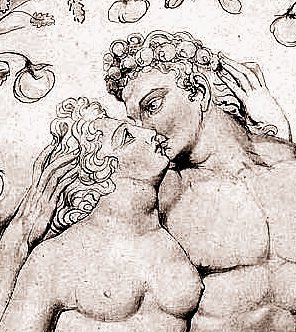
by William Blake
Where does a specific character naturally fall within the
norms of his/her culture? How does he deal with the conflict between desire (or
abhorrence) and expectation? Are other options (secrecy, emigration to a more
compatible culture, open defiance) possible for him or her? Not all characters
experience the same degree of sexual energy, and most will vary in their
interest, depending on circumstances. Some will react to stress by becoming
more sexual, while others will respond with diminished desire, even becoming
asexual. Some interpret every personal interaction in sexual terms, and others
are extremely private or compartmentalized. Interesting characters, like
interesting cultures, are not monolithic in their sexuality.
Sexuality has a special role in fantasy stories because of
its universality (or near-universality) in human experience, and its power.
It’s fairly common to use sexual energy as the basis for magic. In some
systems, magicians create power by channeling the sexual energy either of
themselves or of someone else, making sex a necessary part of magical use. But
in other systems, sexual energy and magic are incompatible, leading to painful
choices for characters and societies.
-------------------
Andrea Hosth
"I like the story, but why do your characters breathe? How is that relevant to the plot?"
"There was eating in this story, which spoiled my enjoyment."
"The protagonist's reconcilement with his father was completely shoe-horned into the novel."
Sounds a little off, doesn't it? Common human experiences marked out as not fitting into a novel. Yet I've heard this time and again in the science fiction and fantasy genres: sex and/or romance is something out of place.
Somehow, an important concern in our hierarchy of needs is cited as something which doesn't belong. Irritable complaints about time spent on a romance subplot are nothing to the disdain directed to novels where relationship content is foregrounded, let alone where there's some descriptive intimacy going on. These novels somehow become classed as "not really fantasy".
Of course, such criticism is not universal, and many fantasy novels delve into sex both as part of the relationships between characters, and also as part of the genre's ongoing exploration of what it means to be human.
When sex becomes part of a story, fantasy opens up many different doors to possibility. What are the social norms of your fantasy world? How do they impact on intimacy? Will there be shifts in who initiates such encounters? Is there an expectation that intimacy leads to permanency? What ability is there to prevent children? What are the laws regarding sex? The unwritten rules behind boy meets boy or girl or other? How many genders are there?
Do their bits fit together?
I'm a cut-away writer for most sex scenes. Where they occur, I'll describe the beginning, and focus more on emotional response than whether tab A goes in slot B. I generally do this because a very detailed description of the sex changes the pace of the story. If there is nothing remarkable about the encounter in itself, then I won't detail it unless I'm writing a story where the relationship content is the primary focus.
The most detailed sex scene I've written in the last few years is contained in what I like to call my "space naga smut" story. There is actually very little sex in this (unfinished) book, but it was necessary to describe the event properly because there was such a physical difference between the participants. I would be in danger of leaving the reader distracted with technicalities outside their usual bounds if I didn't lay that encounter bare.
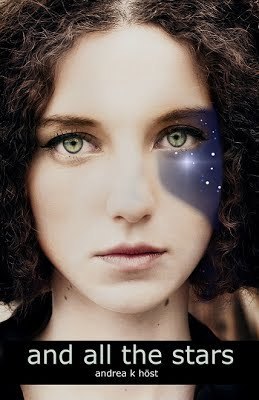
Books which explore sexuality, particularly positive portrayals instead of the lovingly detailed rape scenes common in recent years, seem to me as deserving of their place in the fantasy genre as books where characters wrestle with honour, betrayal, or the vagaries of dark lords.
Andrea K Höst was born in Sweden but raised in Australia. She writes
fantasy and science fantasy, and enjoys creating stories which give her
female characters something more to do than wait for rescue. See: www.andreakhost.com
------------------
Carole McDonnell
As a writer of Christian fantasy, I have hurdles to jump over when it comes to writing about sex. First, there are the moral rules I have to follow. Rules dictated within the Bible and rules followed by Christians outside the Bible which may or may not be Biblical but which fall into the category of "acceptable for Christian readers."
So far, I have not had a homosexual character appear to me wanting a story to be written about him. I have however had characters who engaged in sexual acts that did not quite fit in with what a Christian fantasy reader would accept.
I have, for instance, created one graphic sex scene and one rape scene. In Wind Follower, I wrote six small sex scenes and got several rebukes from Christian readers for writing them, although there is no way those sex scenes could have been described as titillating because there was so much woundedness, cruelty, and evil involved.
I did create a mini-harem of sorts in Wind Follower: a man with a wife and a concubine. No one was really bothered by that sexual situation because Christian and/or western readers are used to stories where men have wives and concubines. In Constant Tower, my novel which will be published by Wildside Press, I create a world where women have two husbands each. I am not sure how that will go over with some folks. The main characters in that "marriage" are teenagers so I had to be careful about being too sexual because although ancient times were different and youngsters married earlier, in our modern times sex between teenagers is taboo.
I think my biggest issue when showing sexuality, other than always worrying about my Christian audience, and trying not to affirm any kind of sexuality forbidden by my religion, is the problem of showing wounded sexuality. I tend to think that all humans are wounded and that this woundedness affects our sexuality. I also think we are confused sometimes and there are people who fall into our lovemaps and folks who fall into our lustmaps. In Wind Follower, my main character Satha probably loved her husband Loic, but I suspected she was more sexually-attracted to her husband's father Taer, and she was probably somewhat sexually attracted to the villain, Noam, even if she hated him. (Ah, if they had met at another time without that pesky family vendetta!)
From what I have seen in many Christian fiction, many characters have majorly sane healthy sex. I don't think that is true in real life. My characters tend to be sickly and often are battling self-loathing, depression, and other mental or physical issues. Sex gets complicated and the joyous blissful perfect combined orgasm is not something one is gonna find in a Carole McDonnell book. This is not to say that I do not understand that a book often carries the writer's wish-fulfillment character. In stories such as A Knight in Shining Armour, by Jude Devereaux and in the Korean drama, Queen In Hyeon's Man, the perfect man of a character's dream (and the reader's perfect man as well) pops up and love and lustmap match perfectly. However, as a writer of Christian fantasy, and as someone who has been ill and someone dedicated to truth (although truth is often merged with wish-fulfillment), I don't think I could ever write a book with joyous unwounded sexuality.
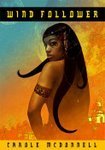
Carole McDonnell is a writer of ethnic fiction, speculative fiction,
and Christian fiction. Her works have appeared in many anthologies and
at various online sites. Her novel, Wind Follower, was published by
Wildeside Books. Her forthcoming novel is called The Constant Tower. http://carolemcdonnell.blogspot.com/
------------
Sylvia Kelso
Sexuality
Pronunciation: /sekʃuˈaləti,
ˌsɛksjʊ-/
noun (plural sexualities)
[mass
noun]
capacity for sexual
feelings: she began to understand the power of her sexuality
[count noun] a
person’s sexual orientation or preference: people with proscribed sexualities
sexual activity: sexuality
within holy matrimony was only justified as a necessary part of
reproduction
There’s an anecdote, probably from Ellen Datlow herself, that she once asked K. L. Jeter to write a story for an antho titled Alien Sex. To which the redoubtable K. L. responded, “What other sort is there?”
Like the equally out-there Rudy Rucker, Jeter is an SF practitioner, but the question could apply as well to fantasy: both are genres of Elsewhere, in my terms. What form of sex could be as native to them as the alien?
Some parameters here: the OED defines “sexuality” as: 1, capacity for sexual feelings, 2, sexual orientation or preference, 3, sexual activity. Since sexual preference/orientation will take us instantly into GLBT territory, slated for a later Table round, here “sexuality” means either 1 or 3. And 3, yes, is K.L. Jeter’s sense, usually the modern shorthand for intercourse. First question, then: what have either 1 or 3 to do with (modern) fantasy?
The immediate answer is, Not much. The basic fantasy story arcs are the Quest and the Battle of Good and Evil, with a common side-helping of Bildungsroman – young wizard grows into/discovers magic. Sexuality, either in 1 or 3’s sense, is not integral to any of these. In fact, all 3are notably missing from early modern or even classic high fantasy, right back to Andrew Lang and Lord Dunsany. This is not surprising in early SF, with Gernsback’s emphasis on a teenage audience, but fantasy has earlier avatars. Sex in the 3rd sense is all over epic and mythology, from Enkidu and the harlot to Circe and Ulysses to Ovid’s Metamorphoses. And it’s at the centre of Malory’s great romance, the epitome of the medieval.
Sex in any sense only “got into” SF in the post-War period, while modern fantasy’s eminence begins in the ‘60s, with the popularity of Tolkien. In SF treatments of sexuality, “human” or alien, suffered at first from stereotyping – most often, the female side, in either 1 or 3, appeared either a victim, a pattern still apparent in Connie Willis’ “All My Darling Daughters,” or another Evil Female stereotype, immortalized by the alien sexual predators in Tiptreee’s “And I Awoke and Found Me Here On the Cold Hillside.” But in SF, with its focus on the idea, second-wave feminism rapidly made sexuality a powerful basis for thought experiments. Ursula Le Guin opened the ball with her biologically gender-fluid aliens in The Left Hand of Darkness, and has continued to construct secondary worlds where sexuality, in both cultural and biological forms, offers a way to rethink our own societ(ies.)
But fantasy is not a genre integrally focused on The Idea. So when sexuality in all 3 senses begins appearing in modern fantasy, the questions arise: why now, and what’s it FOR?
The superficial first answer is that even fantasy writers can’t escape their cultural matrix. Coleridge’s Gothic verse romance created uproar over a glimpse of the wicked Geraldine’s naked “side” – not even her breast, mind you – in an age when rape of female servants, by male peers or masters, was a commonplace. Nowadays it’s an expectation that fiction include more and more explicit sexuality. A modern fantasy writer would not think of constructing a secondary world without reference to the inhabitants’ sexualit(ies).
Hence the skirts of the fantasy mountain now brush the modern genres of erotica and (commercial) romance. Admittedly, modern fantasy in sense 3 usually escapes the stock genre romance patterns, where descriptions of intercourse have become almost paint-by-numbers predictable. But steamy sexual encounters for major fantasy characters are now more usual, and some fantasy would count as erotica, if not porn. Jacqueline Carey’s Kushiel books, Laurell Hamilton’s Meredith Gentry series, are only two that come to mind.
But if sexuality’s not a way of thinking about ideas, what’s it FOR? One functional answer is, sexuality humanizes. The Quest or the Battle of Good and Evil push a hero, in particular, to Deeds, not Words, let alone Lust. Consequently, as Tolkien discovered with irritation, he can turn out a stick, like Aragorn. But a hero who suffers from sexual passions or sexual handicaps or just plain inability to keep his trousers buttoned – very notably, Lois McMaster Bujold’s apparent hero Arhys in Paladin of Souls – is far more engaging. Malory already knew this, way back when he crafted Lancelot and Galahad.
Beyond actual sex, there’s all the delicious UST so beloved of fanfic writers. (Unresolved Sexual Tension, for the ignorant like me) and so useful for driving a narrative. The dynamo for Tanya Huff’s first novel, The Fire’s Stone, was the long-term UST between the protagonist and his eventual male lover. But UST is routinely done just as easily in realist genres. What, then, can sexuality be for solely in fantasy?
One answer is the term I started with. Alien sex. That is, sexual capacities that are not human, sexual activity that may involve partners more or less than human. Bestiality is a very gray area at the moment for publishers, but alien sex doesn’t merely have to mean sex with animals. It can be truly alien, in fantasy as much as in SF.
To mention only two notable examples, Sheri S. Tepper’s heroine in Grass eventually escapes her alien planet’s tyranny with a “native” lover who, from glimpses in the later Sideshow, may well be some form of god. In the last of her Door series, Diane Duane group-marries seven main characters, including a fire elemental, a gay king and his partner, and two other couples, including the female warrior Segnbora and the dragon Hasai – referred to as “he,” but whose answer to, “What do dragons do to get married?” is, “Get pregnant, of course.” Whether Hasai or Segnbora is to do so isn’t quite clear.
Alien sex can be much more integral, as in Mary Doria Russell’s The Sparrow, which focuses on the protagonist’s own sexuality, in senses both 1 and 2. But the alien sex he encounters is confronting and horrifying. On the other hand, in Hamilton’s Gentry series, sex with the alien – goblins, half-humanoids, gods – acquires even religious overtones, because it raises and recovers the Goddess. I’m not fond of Hamilton’s vanilla elf-porn, but as in Grass and Door into Sunset, there are scenes – when the Faerie Dun walls move to create a garden, for instance – when alien sex achieves that hoary goal of both genres: the reader experiences the sense of wonder that comes from a fleeting glimpse of another, un-human and enchanting world. If sexuality becomes a reclaimed weapon in the Elsewhere genre-writer’s search to grasp that moment, so much the better, say I.
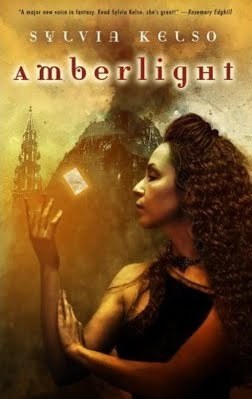
Sylvia Kelso lives in North Queensland, Australia. She writes fantasy and SF set in analogue or alternate Australian settings. She has published six fantasy novels, two of which were finalists for best fantasy novel of the year in the Australian Aurealis genre fiction awards, and some short stories in Australian and US anthologies.
--------------
Warren Rochelle
Musings on Tolkien, Sex, and Fantasy
Tolkien is described in The Encyclopedia of Fantasy as “the 20th-century’s single most important author of fantasy” (951). To say his influence is profound and lasting seems to be stating the painfully obvious. Middle-earth has become a template for many fantastic worlds—to the point these other worlds could be considered clones. But, the master is not without flaws; his shortcomings with female characters have often been discussed. All of which made me curious to explore in a little more depth, Tolkien’s use or non-use of sex and sexuality in his fantasy. Just what does Tolkien say about sex and sexuality and how are they expressed in his fantasy?
For the sake of disclosure, let me insert here that while I am not a Tolkien scholar, I am a big fan and have been since I was twelve or so and read The Hobbit and the trilogy for the first time. I have read them over and over again since and teach Tolkien in both my fantasy lit class and in a senior seminar focusing solely on his fantasy. A Tolkien-basher I am not.
Romantic relationships are certainly present in Tolkien, such as the great love story of Aragorn and Arwen, Eowyn’s crush on Aragorn, and later her love for Faramir, Sam and Rosie, and the long-lasting marriage of Galadriel and Celeborn. As each of these couples had at least one child—Sam and Rose, thirteen—they had to have had sex, sex that occurred off-stage. Love between these couples that is expressed on-stage, more or less, doesn’t go much beyond kissing and hand-holding. Sex has the sanction of marriage—no fooling around before. Tolkien was nothing, if not a traditionalist in such matters, as he makes clear in a March 1941 letter to his son Michael. Yes, a “man’s dealings with women can be purely physical” … It is better, if he is a “lover … engaging and blending all his affections and powers of mind and body in a complex emotion powerfully coloured and energized by sex” (Letters 48), and this should happen in marriage, Christian marriage. Sex, and even love, can be, and has been used as occasion for sin, because, as Tolkien reminds us, “The Devil is endlessly ingenious and sex is his favorite subject” (48). Our notions of love and sex are also confused by the romantic chivalric tradition and its idealized concept of love, which Tolkien asserts, has the weakness of beginning as “an artificial courtly game,” and is not “wholly true.” This idealized love tends to get people in serious trouble, all the way to the “divorce courts” (49). We are, after all, all fallen beings in a fallen world.
This brings us back to the ideal of Christian marriage, which Tolkien argues is much easier for women than men, as the former are naturally monogamous; the latter, not so much: “No man, however truly he loved his betrothed and bride as a young man, has lived faithfully to her as a wife in mind and body without deliberate conscious effort of the will, without self-denial” (51). Yes, this does make one wonder, about Tolkien’s own marriage. That he was devoted to Edith, there is no doubt. Did he commit lust in his heart? Tolkien doesn’t say, of course, although in the same letter, he tells his son the story of his relationship with Edith—falling in love as a teenager, separated by the edict of his guardian until his majority, the letter sent on the night he became 21, and their subsequent marriage. He tells his son at the end, love the Blessed Sacrament first and foremost, and that will be “the true way of all your loves upon earth” (53).
So, love God first, no sex before marriage. Sex off-stage in marriage—and yes, it should be enjoyed, but sparingly. As Tolkien explains in the draft of a 1943 letter to C.S. Lewis, “Christian marriage is not a prohibition of sexual intercourse, but the correct way of sexual temperance—in fact probably the best way of getting the most satisfying sexual pleasure” 60). Christian marriage, as Tolkien describes it, is also clearly meant only for heterosexuals. He thought of homosexuality as a disorder. The job comes first—saving the world, fighting evil, running a country, farming, and so on. This doesn’t just apply to humans, either. Only about a third of the Dwarves were female, and not many of Durin’s folk married: “the number of dwarf-men that marry is actually less than one-third. For not all the women take husbands: some desire none; some desire one that they cannot get, and so will have no other. As for the men, very many also do not desire marriage, being engrossed in their crafts” (Return of the King 360).
As for the Elves, Tolkien’s ideal people, yes, they like sex: “the union of love is indeed to them great delight and joy”—but only in marriage, and only for a relatively short time in their long lives. Elves are sexually active for a “period of one of several hundred years,” and “are seldom swayed by the desires of the body only, but are by nature continent and steadfast.” After the children are born, they lose interest. “With the exercise of the power (of generation), the desire soon ceases, and the mind turns to other things . . .” Marriage can be a matter of “free consent,” done without ceremony or witness, but once consummated, they are married for life. No elf casual sex (in “Laws and Customs of the Eldar,” Morgoth’s Ring, History of Middle-Earth).
Tolkien was a man of his time and culture, and very orthodox in his Catholicism. His attitudes toward sex and sexual expression are not surprising. His characters remain true to the ideals and values of the man who created them. Does this mean they can’t be seen as fully-expressed human beings? For many contemporary readers, I think the answer is yes. Is that fair? A failure on Tolkien’s part? As a big fan, I hesitate here. Sex doesn’t have to happen on-stage, after all, nor does it have to be part of a particular story, and there are some people who are asexual and some who are celibate. But, as Deborah Ross notes in another blog in this same round, “sex is such a powerful force in human lives it is impossible to portray the full scope of emotions and motivations without it.”
I don’t think Tolkien would disagree, but I cannot imagine him approving of casual sex, homosexuality, premarital sex, and a whole list of sexual behaviors with which 21st-century readers are okay. Would the people in The Lord of the Rings be richer and deeper characters? Maybe—but would they still be Tolkien’s?

Warren Rochelle has taught English at the University of Mary Washington
since 2000. His short story, "The Golden Boy” (published in The Silver Gryphon) was a Finalist for the 2004 Gaylactic Spectrum Award for Best Short Story and his novels include The Wild Boy (2001), Harvest of Changelings (2007), and The Called (2010. He also published a critical work on Le Guin and has academic articles in various journals and essay collections.
http://warrenrochelle.com

Published on June 27, 2012 10:53
June 22, 2012
Summer Reads: A Few Random Book Reviews

Summer reading evokes images of beach chairs or hammocks, lazing around with undemanding stories. While I indulge in my share, I also think it's good to give my brain at least a little exercise, too. Summer's a good time to catch up on books I've been hearing about, and to try something new. So here's a potpourri of what I've been enjoying.
N.K. Jemisin, The Hundred Thousand Kingdoms. Despite all the fuss over this debut fantasy
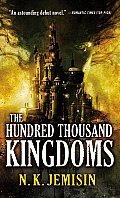 novel, it took me a while to pick it up. I'm not sure what I can usefully add to what has already been said, except to say that the praise is richly deserved. There's a bit of a bobble at the very opening, for me, at least, but that is undoubtedly a matter of taste and it doesn't last long. Very cool stuff about a castle that's a whole city, byzantine schemes and some very unpleasant, ruthless people, a few enslaved and therefore resentful gods, a heroine on the track of her mother's killer, and occasional moments of stunning compassion. Very shortly, I was immersed and am now looking forward to reading more by Jemisin.
novel, it took me a while to pick it up. I'm not sure what I can usefully add to what has already been said, except to say that the praise is richly deserved. There's a bit of a bobble at the very opening, for me, at least, but that is undoubtedly a matter of taste and it doesn't last long. Very cool stuff about a castle that's a whole city, byzantine schemes and some very unpleasant, ruthless people, a few enslaved and therefore resentful gods, a heroine on the track of her mother's killer, and occasional moments of stunning compassion. Very shortly, I was immersed and am now looking forward to reading more by Jemisin.Connie Willis. Blackout/All Clear. Time-traveling historians visit the London Blitz, get trapped
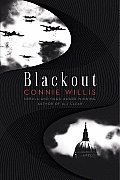 there, try to find a way home without changing history and thereby creating a future in which their world (and their time machine) does not exist. All done up in inimitable Connie Willis style. This two-part novel is (fortunately or unfortunately, according to your taste) downright chatty, with lots of conversations in which characters alternate between discussing the minutia of surviving in a dangerous historical period and trying to figure out either how to get home, why their failsafe return strategies aren't working, and whether they are inadvertently changing history. If you like dialog, you'll relish them, but if you find this sort of detail tedious, the story will be slow going. Crucial details are planted in the midst, and if your eyes are glazing over, you'll miss them. Another objection I've heard, although it wasn't an issue for me, was the
there, try to find a way home without changing history and thereby creating a future in which their world (and their time machine) does not exist. All done up in inimitable Connie Willis style. This two-part novel is (fortunately or unfortunately, according to your taste) downright chatty, with lots of conversations in which characters alternate between discussing the minutia of surviving in a dangerous historical period and trying to figure out either how to get home, why their failsafe return strategies aren't working, and whether they are inadvertently changing history. If you like dialog, you'll relish them, but if you find this sort of detail tedious, the story will be slow going. Crucial details are planted in the midst, and if your eyes are glazing over, you'll miss them. Another objection I've heard, although it wasn't an issue for me, was the Marissa Meyer. Cinder. Retellings of classic fairy tales are hot stuff these days. This one (whose
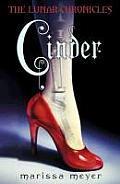 title leaves no doubt as to which story it is) is a particular delight because not only is Cinder a cyborg (a secret she's at pains to disguise because of rampant anti-cyborg prejudice) but she's a computer mechanic. Smart, capable, and not at all interested in the attentions of Prince Charming. She has better things to do with her life than attend a ball -- like plan her own escape from servitude. One of the twists that most delighted me was the affection and loyalty between Cinder and one of her stepsisters, her only human friend.
title leaves no doubt as to which story it is) is a particular delight because not only is Cinder a cyborg (a secret she's at pains to disguise because of rampant anti-cyborg prejudice) but she's a computer mechanic. Smart, capable, and not at all interested in the attentions of Prince Charming. She has better things to do with her life than attend a ball -- like plan her own escape from servitude. One of the twists that most delighted me was the affection and loyalty between Cinder and one of her stepsisters, her only human friend.Trey Shiels (Linda Nagata), The Dread Hammer. I discovered Linda Nagata as a science fiction writer, inventive and thoughtful. Her fantasy is no different.
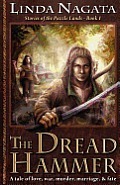 This is not a story to be read superficially, for my first impression was a series of unsympathetic characters who deserved whatever is coming to them. The protagonist is a young man with the magical ability to move invisibly from one place to another and a penchant for slaughter; emotionally, he's an infant, as apt as not to casually eliminate anyone who might pose a problem in the future. But Nagata is too skilled and subtle a storyteller to resort to stereotypes. Nothing is as it seems and how we view characters -- and their own capacity for self-knowledge and change -- evolves along with the story line. Who is the monster here? Who is the hero? Can love and loyalty change people? Or is it the other way around, that people warp the meaning and uses of devotion and honor? There are no simple answers here, only a story that is deeply respectful of the reader's ability to draw his own conclusions.
This is not a story to be read superficially, for my first impression was a series of unsympathetic characters who deserved whatever is coming to them. The protagonist is a young man with the magical ability to move invisibly from one place to another and a penchant for slaughter; emotionally, he's an infant, as apt as not to casually eliminate anyone who might pose a problem in the future. But Nagata is too skilled and subtle a storyteller to resort to stereotypes. Nothing is as it seems and how we view characters -- and their own capacity for self-knowledge and change -- evolves along with the story line. Who is the monster here? Who is the hero? Can love and loyalty change people? Or is it the other way around, that people warp the meaning and uses of devotion and honor? There are no simple answers here, only a story that is deeply respectful of the reader's ability to draw his own conclusions.Franny Billingsley, Chime. In some ways, this YA Norton Award Finalist reminded me of one of my favorite books, Charmed Life by Diana Wynne Jones. Part of the resemblance is the way magic is woven into a Victorianeque sort-of-steampunk setting, but part is the interplay between how the young, unreliable narrator sees herself (in this case, she must keep secret that she's a witch and her anger can harm the people she loves) and how others see her -- how I as the reader come to see her.
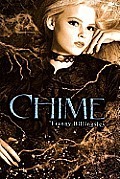
The teen years are fraught with self-uncertainty, at least mine were. We're trying to figure out who we are, what we're like, what we have control over. We tell ourselves and others stories about ourselves, and not all of them are true. What are the consequences of lies we know we're telling? What about those lies other people have told about us that we actually believe? Briony, the narrator of Chime, has more than her share of secrets. She also has a keen intellect, an unquenchable sense of humor, and a willingness to sacrifice herself for those she loves that connects with not just teen readers but those of all ages.
Many books contain a scene that in itself is "worth the price of admission." Chime contains an encounter with flying witches on the wild swamplands. When the witches take to the air, their lack of undergarments is made quite clear as they waggle their naked backsides at the astonished hunters (who then have the wisdom to not mention this aspect in their report).
Marianne de Pierres, Glitter Rose. I found this little collection of short stories in my goodie bag at the last World Fantasy Convention. Otherwise, I might never have known about it, as it's from a small print run by an Australian publisher (Twelfth Planet Press). These are exquisite stories, understated in the best sense of the word, with weirdness and mystery (and a little drama here and there) woven into them. Most of them follow the narrator as she arrives on a tropical island, seeking solace for a deep wound that she can't even bear to describe. The island, however, is subject to waves of wind-borne spores that generate "exotic, often terminal afflictions" for anyone who cannot afford the expensive antidote. As Tinashi settles into her self-imposed exile, she develops relationships with the island's inhabitants, layer by layer exposing their secrets, her own, and those of the tidal spores.
With th [image error] e last of the sunset...strange phosphorescence claimed the sand, colorless at first and rapidly changing to a carpet of tiny, shining, rose-coloured grains. Something about them compelled me to hasten to the beach and run them through my fingers and toes.
I must have stirred, because Geronimo and Arthur Wang each laid a hand on my arm.
"The spores are active," Arthur Wang explained. "Walking on the beach during glitter rose can be..." he trailed off.
Geronimo took it up, his voice a quiet boom. "What the Prof. Is saying, Tinashi, is -- if you walk on the beach at glitter rose, you might has well feed your Tyline to the fish. And you don't know what the spores will do. How they will change you. Everyone is different. The locals, I mean. Some things you can see, like the eyes and the water retention in the forehead. Others it's only on the inside. They're the ones to watch. You never know about them. By heaven, it's tempting though." His voice brimmed with emotion in that last sentence, like a man on the limit of endurance.
I glanced among them then, and saw the feeling mirrored in their faces. Longing. And fear.
I gulped my pink champagne deeply and felt the tingle waken dead places in me.
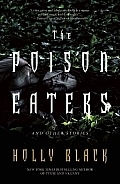 Holly Black, The Poison Eaters and other stories. I'm all over the place with Holly Black novels; loved Tithe, hated The White Cat. I approached this collection with a bit of trepidation, but found the stories to be well-written, quirky, sometimes a tad gruesome or sad or pessimistic, but always engaging. I think the key word is consistent, and it was quite wonderful to see how an author maintains literary quality and sensibilities, a moral compass as it were, regardless of genre or plot or character specifics. I think that's the mark of a professional who takes her craft seriously, and is well worth paying attention to.
Holly Black, The Poison Eaters and other stories. I'm all over the place with Holly Black novels; loved Tithe, hated The White Cat. I approached this collection with a bit of trepidation, but found the stories to be well-written, quirky, sometimes a tad gruesome or sad or pessimistic, but always engaging. I think the key word is consistent, and it was quite wonderful to see how an author maintains literary quality and sensibilities, a moral compass as it were, regardless of genre or plot or character specifics. I think that's the mark of a professional who takes her craft seriously, and is well worth paying attention to.Daniel O'Malley, The Rook. This is subtitled, On Her Majesty's Supernatural Secret Service, and it's part amnesiac-female-James Bond With Cthulhu, part mystery, and part Secret Alchemical Societies At War. Myfanwy Thomas, a highly-placed member of HMSSS, wakes up with a badly bruised face, a circle of dead bodies, and no memory of who she is or what
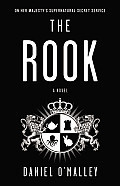 happened. Being the insanely organized person she was, she's written a series of letters to herself, explaining what she does for this secret agency and how she came to believe that her memory would be wiped clean on this particular date. Then it's up to "new" Myfanwy to not only discover the traitor in the agency, but to keep up the pretense of being who she is. Unfortunately the "old" Myfanwy was quite a timid doormat, and the "new" version stands up for herself, making for some interesting situations. This also got me to wondering about the reasons amnesiac characters work (or don't work). At their best, they evoke resonances of our own experiences trying to figure out who we are and how we got here. (At worst, of course, the amnesiac hero/ine represents the blankness of the author's imagination...) The Rook is engaging and great fun, if a little heavy on the bodily fluids in places.
happened. Being the insanely organized person she was, she's written a series of letters to herself, explaining what she does for this secret agency and how she came to believe that her memory would be wiped clean on this particular date. Then it's up to "new" Myfanwy to not only discover the traitor in the agency, but to keep up the pretense of being who she is. Unfortunately the "old" Myfanwy was quite a timid doormat, and the "new" version stands up for herself, making for some interesting situations. This also got me to wondering about the reasons amnesiac characters work (or don't work). At their best, they evoke resonances of our own experiences trying to figure out who we are and how we got here. (At worst, of course, the amnesiac hero/ine represents the blankness of the author's imagination...) The Rook is engaging and great fun, if a little heavy on the bodily fluids in places.The painting at the top of the blog is "Reading By The Shore," by Charles Sprague Pearce (1851-1914), public domain.

Published on June 22, 2012 15:09
June 14, 2012
One Stitch At A Time: Knitting For Peace

Teddy Bears for African kids
A piece of knitting is, with few exceptions, one long strand of yarn, looped back on itself. Every part of it is connected, and if one pulls the loose end, one can unravel the entire piece of fabric. That’s the philosophical aspect of knitting.
Knitting creates communities, and every knitter has stories of personal connections. I learned to knit as a child. My mother taught me, as her mother had taught her. This is a lineage of love, of people, mostly women, sitting together and passing on stories as well as stitches. Later I learned to hold the yarn in my left hand from a college friend who had learned it from her German host family when she was an exchange student.
My collection of needles is a potpourri of stories. A few I have bought new, including the beautiful set of rosewood double-pointed needles on which I knit a pair of bamboo-silk socks for my sister to comfort her feet after surgery. Some have come to me from my mother, so lovingly used over the years that the printed sizes have worn off. Others appeared in the boxes of yarn from my first mother-in-law, most likely from the senior center she frequented, so I will never know the women--or possibly the men--who began projects on these needles, only to leave them half-finished. I love these untold stories, even as I add my own and pass them on.
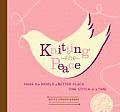 Over the years, I knitted many sweaters, scarves, hats, even an afghan or two, mostly for family and friends. Then about 4 years ago, I came across Betty Christiansen’s Knitting for Peace: Make the World a Better Place, One Stitch at a Time. I read about the history of wartime knitting, the Revolutionary Knitting Circle, Peace Fleece, and programs that teach knitting to prisoners.
Over the years, I knitted many sweaters, scarves, hats, even an afghan or two, mostly for family and friends. Then about 4 years ago, I came across Betty Christiansen’s Knitting for Peace: Make the World a Better Place, One Stitch at a Time. I read about the history of wartime knitting, the Revolutionary Knitting Circle, Peace Fleece, and programs that teach knitting to prisoners. My projects shifted to a different focus: I knit a prayer shawl for a dying friend and a lap robe for my second mother-in-law during her final illness. With each stitch, I held in my mind wishes for peace, for love, for understanding.
Soon I was venturing further afield. Friends scoured thrift shops for balls of yarn for me. Armed with scraps of acrylic yarn and a simple pattern, I concocted dozens of teddy bears for the Mother Bear Project. These go to orphans in Africa and other emerging areas, most of whom have lost their parents to AIDS or are themselves infected with HIV. Mother Bear was started by one woman, Amy Berman, after reading a magazine article on the plight of South African children. To date, over 49,000 bears have brightened the lives of those who have so little.
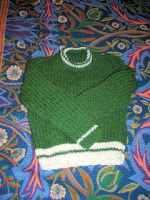
When I get my hands on wool yarn, I make children’s clothing and baby blankets for afghans for Afghans. The winters are so bitterly cold that synthetic yarns don’t provide enough warmth. I make a lot of mittens, since they don’t take a lot of yarn and are small enough to be easily portable. Last year, I made 12 pairs of them, plus various socks and vests and the odd hat, baby blanket, and sweater. Now I’m knitting with delicious wool/mohair yarn from Peace Fleece, which supports wool producers in Russia, Israel/Palestine and Romania, as well as Maine. The proceeds from the sale of their beautiful “Baghdad Blue” yarn are donated to the Palestinian/Israeli village of Neve Shalom/Wahat al Salaam. A thread of friendship now stretches from Israel to Afghanistan, via my own living room in California.
The way I see it, I can’t wave a magic wand and cure AIDS. I can’t solve Afghanistan’s problems or those of the Middle East. I can’t bring peace anywhere except my own heart. But I can bring a smile to one child’s face and send another child a warm sweater or pair of mittens. I can send a blanket to wrap a newborn baby in when she goes home. There is something direct and personal about a hand-knitted garment; it says there is a real person who cared enough to create this for you. Perhaps all this does is make me feel less powerless. But perhaps that child, that family, will remember. Perhaps, one stitch at a time, it will make a difference.
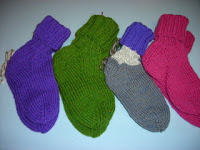
Wool/Mohair socks for Afghan kids

Published on June 14, 2012 18:42
June 11, 2012
The Feathered Edge: Swords, Souls, and Editing Tanith Lee

What is there to say about editing a Tanith Lee story? You sit there, holding the typewritten manuscript that she sent you, and something in your brain turns itself into total fan-girl jelly. But you already knew that.
To begin with, the first Tanith Lee story I worked on was for Lace and Blade (Norilana Books, 2008). She'd agreed to submit a story in the very early planning stages of the project, before I came onboard as editor. And it was my first gig as editor. Over the years, I'd worked with a bunch of different editors, and had ideas about what worked for me, what didn't, and how I wanted to interact with writers "from the other side of the desk." Marion Zimmer Bradley had been a role model and inspiration about how to encourage new writers. After years of participating in writer's workshops and teaching adult education classes in writing, I was all set to instruct and guide.
None of this prepared me for the experience of holding in my hands an original typewritten Tanith Lee manuscript.
The first, and most important thing, I had to do was to take off my fangirl hat and my fellow-writer hat and affix my editor hat firmly to my head. This involved an excruciating change of gears. I made mistakes. Of course, I made mistakes. (And learned how to clean them up.) I wasn't born knowing how to edit, let alone how to edit iconic authors in whose shadows I have long stood. Tanith herself encouraged me. She wrote to me, "On editing though - like writing, I feel strongly one must do what one feels is right. In me, of course, you run into an old war-horse, 40 years in the field, covered in armour and neighing like a trumpet." Which was a most gracious way of acknowledging that the relationship between an author and an editor is an organic process, when at its best rooted in clear communication, deep listening, and respect. Not intimidation (in either direction), but a partnership in which both people have the same goal -- to make the story the best representation of the author's vision.
By the time I received, "Question A Stone," Tanith and I had evolved out a procedure that worked for both of us. It begins with her sending me a typewritten manuscript. In a 1998 interview, she said, "I have to write longhand, and no one can read my writing, I have to type my own manuscripts, because I'm going almost in a zigzag, across and then down. (I don't write backwards, I've never been able to do that!) I used to throw away my holograph manuscripts after I'd typed them, but I'm keeping a lot of them now, because I'm starting to think, if anyone
 ever is interested in me after I'm dead, they can look and see, 'My god, this woman was a maniac!'" I've tried scanning the pages into a digital file, but all the corrections and irregularities of type, not to mention the paper being British-sized rather than American-sized, means the result requires an enormous amount of line-by-line clean-up. So I transcribe it (and the print out and send her a copy for review, which amounts to a preview of proof pages.) I've heard this technique suggested for beginning writers -- type out pages from the published works of your favorite authors, to get an inside look at how the story is put together, how the prose works, all the details you miss when you read; the action of typing (or writing out the passages longhand) engages your brain in a different way. Transcribing Tanith's manuscripts taught me an immeasurable amount about how she crafts her prose and weaves together the details of character, setting, dialog, plot, the works.
ever is interested in me after I'm dead, they can look and see, 'My god, this woman was a maniac!'" I've tried scanning the pages into a digital file, but all the corrections and irregularities of type, not to mention the paper being British-sized rather than American-sized, means the result requires an enormous amount of line-by-line clean-up. So I transcribe it (and the print out and send her a copy for review, which amounts to a preview of proof pages.) I've heard this technique suggested for beginning writers -- type out pages from the published works of your favorite authors, to get an inside look at how the story is put together, how the prose works, all the details you miss when you read; the action of typing (or writing out the passages longhand) engages your brain in a different way. Transcribing Tanith's manuscripts taught me an immeasurable amount about how she crafts her prose and weaves together the details of character, setting, dialog, plot, the works.On the computer print-out, I highlight anything I have questions about, she catches my typos, I catch hers, and what she sends back is ready to go in the final anthology line-up.
"Question A Stone" involves two superb and very sexy swordsmen who, through a twist of circumstances, find themselves committed to fighting a duel to the death, despite having fallen in love with one another. Their swords, being magical, have other ideas. The whole adventure takes place in an inn called The Chameleon's Arms, a delight suggested by Tanith's husband, John Kaiine.
Here's where to buy the whole delicious anthology in ebook or trade paperback editions from Amazon: or from Barnes & Noble or, if you prefer an independent bookstore, Powell's online (paperbck only).
The chameleon photo is by Volker Herrmann, licensed under Creative Commons.

Published on June 11, 2012 13:21
June 8, 2012
Book Review Kit -- Just Add Adjectives and Mix!

In case you missed this blog post on Book View Cafe, here it is to enjoy. Feel free to post your own book reviews under Comments!
Have you noticed how alike many book reviews are? Aside from recapitulations of the plot, the same words might apply to almost any book. Therefore, as a service to discerning readers (and a hoot and a holler, besides), Book View Café presents the newest innovation in book reviews. Design your own inimitable personalized reviews using this cutting-edge technique!
First, you will need to assemble a number of words. The exact order doesn't matter, so long as you match nouns with nouns, adjectives with adjectives, and so forth. By mixing up the order, you can create even more variations, so you can use the same basic review for almost any book!
First, select words from the following lists (or make up your own). It's best not to peek at the review itself until you have them written down so you can't change your mind.
A. Adjectives (select 3)
intriguing
thrilling
fascinating
enthralling
evocative
heart-warming
sensitive
suspenseful
B. Adjectives (select 2)
heroic
sympathetic
transcendent
exotic
post-apocalyptic
memorable
powerful
gut-wrenching
C. Adjectives (select 3)
flesh-eating
magical
disturbing
fully-rounded
romantic
reincarnated
clever
doomed
You'll also need:
2 words which are the name of a genre (like fantasy or horror)
an adverb
2 plural nouns (like cats or galaxies)
2 verbs
an adjective describing action (like frantic or slow)
an adjective describing a historical period (like Colonial or prehistoric)
a type of character (like villain or sidekick)
6 nouns of your choice
Got them ready? Okay, insert them in the appropriate slots and let's go! Remember, you can mix and match to use your book review for just about any occasion!
This is a (A) and (B) (name of genre) novel, and the (A) story line enhances the (adverb) tale. From the onset, fans will welcome the (plural noun) as each character struggles to (verb) the (noun) of the (C) (plural noun). The characters are then caught up in a (adjective describing action) (noun) to (verb) the world. The author makes the setting seem as if it comes from (adjective describing historical period) books rather than her imagination. The cast of characters is (C), especially the (type of character). However, it is the (noun) and the (noun) that spellbind the audience as no one knows the (A) secret of the (C) (noun). Loaded with (noun), fans will not want to put down this (B) (genre) novel.

Published on June 08, 2012 12:11
June 1, 2012
Book View Cafe Wild Rumpus... er, New Bookstore Launch
For
lo, these many months, the elves at Book View Café, beloved spouse
among them, have been laboring to transform the ebookstore into
something elegant and user-friendly, in which browsing means discovered
very cool new books as well as old out-of-print favorites. Now it's done
and up and we want all our friends/n/relations to celebrate with us.
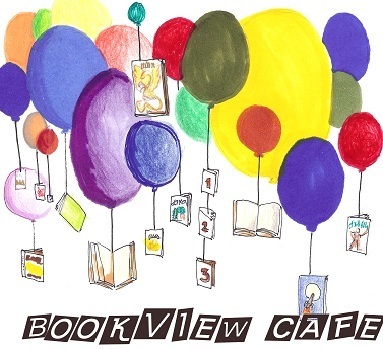
To
that end, we're giving our readers a chance to win the book of their
choice free. There's a lot of hoopla about whether such events are
helpful, but I hope this one will be fun. The point is to invite you to
check things out. Who knows, you might find something you want. (And
such a deal - 95% of the price goes to the author.) So here's the
skinny:
BVC's spiffy new bookstore.
Take a look around the store anytime up until midnight,
June 8, and choose the book you’d like—all the books that are eligible
for the giveaway are marked with a gold star. (Omnibus editions and a
few other books aren't eligible.) Then come back here and leave a
comment with the name and author of the book and why you want it, with
the understanding that by entering, you give us permission to use your
comment for publicity purposes - so be brilliant. When the promotion
ends, I'll select a winner by a mysterious and entirely random process -
which means I've written down a date and time, and whoever posts
closest to it wins. If you’re the winner, I’ll send you a coupon for the
book of your choice.
If you are
posting as Anonymous, that's fine. Just identify yourself as a person
rather than a spambot. Comments here and on my LiveJournal will be combined, so don't leave yours in more than one place.
In addition, to express my appreciation
for your hanging around my place here, I'll select 3 other people (by a
method identical to above) to receive either a 50% coupon for either of
my ebooks (Jaydium or Northlight) or a mass market paperback edition of Zandru's Forge, A Flame in Hali, The Alton Gift, or Hastur Lord.
Want
to enter more than once? Can't do it here - I'll get grouchy. Check out
these other BVC author sites where you can enter for additional chances
to win:
Maya Kaathryn Bonhoff
Chaz Brenchley
Patricia Burroughs
Jeffrey Carver
Amy Sterling Casil
Laura Anne Gilman
Lois Gresh
Kit Kerr
Katharine Eliska Kimbriel
Kelly McClymer
Vonda N. McIntyre
Nancy Jane Moore
Linda Nagata
Pati Nagle
Steven Harper
Phyllis Irene Radford
Patricia Rice
Madeleine Robins
Sherwood Smith
Jennifer Stevenson
Judith Tarr
Dave Trowbridge

Published on June 01, 2012 13:13
May 31, 2012
Convention report
I occasionally write up my notes from a convention. What I remember, that is. For those who enjoy such reports, BayCon 2012 is here.


Published on May 31, 2012 18:40
May 25, 2012
Eclipse Diary, Part 4 - Afterthoughts
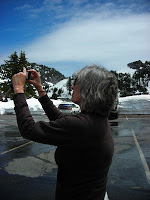
Chris at Lassen Park
The next morning, my friend and eclipse-buddy Chris and I drove up to Lassen Volcanic National Park, as she had never been there before and it seemed a shame to drive all the way and not see any of it. The road was closed by snow only a few miles past the entrance, but we stopped to goggle at the snow-draped mountains and sulfur vents. As the perfect ending to our adventure, we met a trio of avid cross-country skiers, preparing for the day’s outing. We swapped eclipse stories and theirs topped ours, hands down. They’d made the ascent to the top of Lassen, broken open a bottle of champagne while they watched the eclipse, and then skied back down.
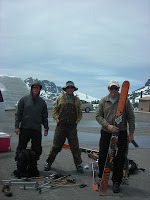
Eclipse Skiing Party
Looking back, I’m struck by the wide range of knowledge of the people we encountered – from the astronomer who had not only his telescope (with solar lens) and camera (with solar lens), but everything hooked up to a laptop, and the physicist who explained to anyone who asked how a pinhole camera works and why the Moon looks red in a lunar eclipse, to the wine-sippers who hadn’t even realized when the eclipse began or what they were seeing. I fell somewhere in between. I want to understand what I’m seeing, but at heart, I’m more interested in what it means in the lives of the people who, to varying degrees and for varying reasons, formed a spontaneous community. I want to spin it all into stories. I suppose that’s why I’m a writer and not an astronomer.
But it sure was cool.

Published on May 25, 2012 01:00



